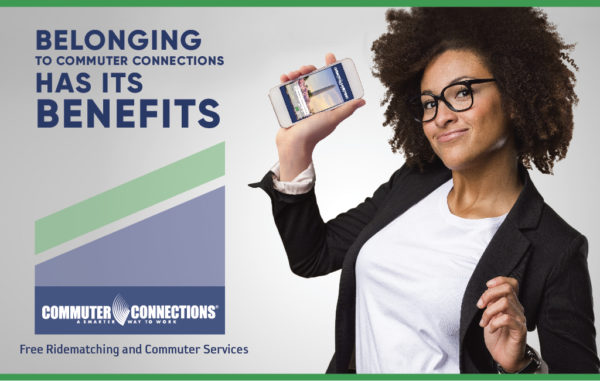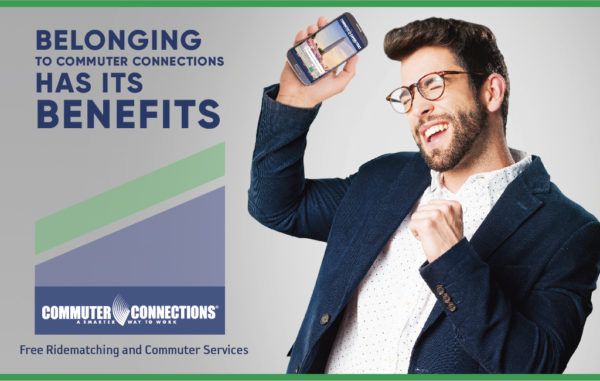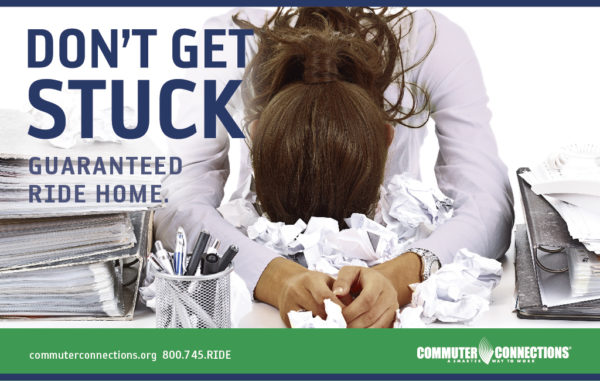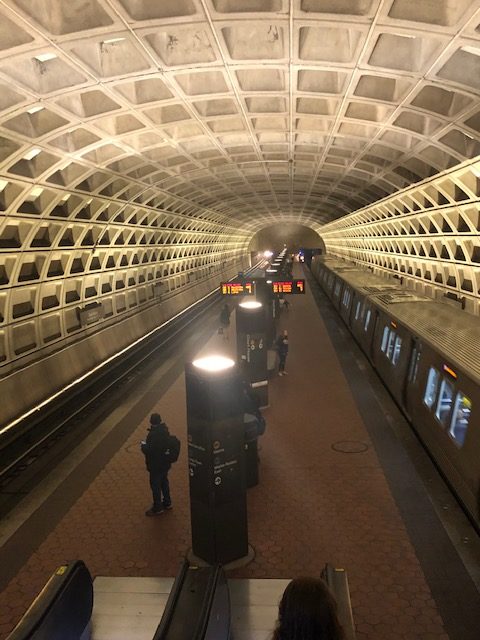
Kristin reports at 8:44am: “I mean traffic is always a little lighter on Fridays but never like this. First picture is Court House platform at 8:30am.

Next the 3rd car of the DC bound train, which even on Friday should be standing room only.

Then, Metro Center at 8:40am, taken from the Glenmont side. It’s really eerie.
On the plus side it means there’s seats or places to lean so no one has to touch the bars.”
Meanwhile on the bus: Read More
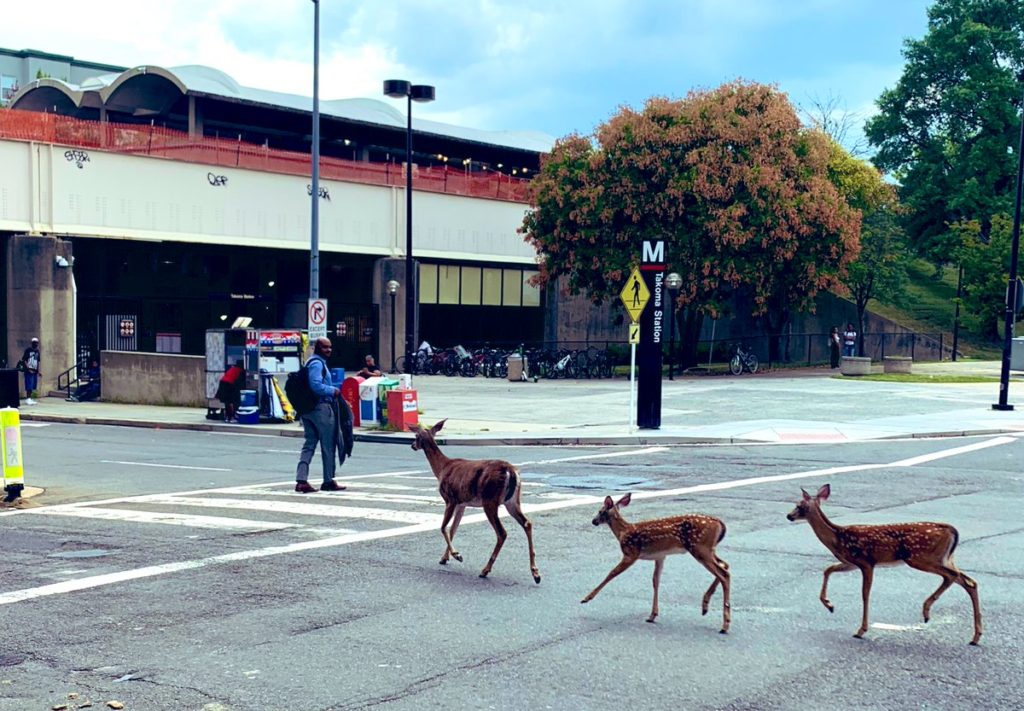
unrelated but awesome photo by Takoma Wellness
StephieK writes:
“@PoPville, I love DC Metro, truly do… but what is up with (some) express bus drivers refusing to pass non-express buses? Stopping behind them at every stop, just hanging out like a teenager lingering behind the cool kid out at the mall.”
Hard to believe, but the Washington, D.C., region is only the sixth worst for traffic, according to transportation analytics compiled by INRIX and reported by USA Today.
Apparently, we spend 63 hours a year in traffic–which seems like a pretty low estimate for many of us.
Each one of the minutes in those 63 hours spent alone in our cars costs us money and aggravation, which turns into stress. Worse, commuters who drive alone contribute to the traffic congestion and expands their carbon footprint.
But van and carpooling saves time, money (an average of $22 a day), and stress; it takes cars off the road; and it reduces personal carbon outputs.
Those interested in joining a carpool and sharing their ride to and from work should do what more than 20,000 others in the region have done and sign up for a free membership with Commuter Connections.
Once they do, they can join the Ridesharing Program and find like-minded commuters who are headed their way.
The Ridesharing Program makes available information and resources to find compatible carpoolers in their area. Members may also sign up for the free CarpoolNow app that connects commuters seeking real-time, on-demand rides to carpool drivers already on the road. And, drivers who offer to pick up a carpool passenger on their way to and/or from work may earn a $10 cash incentive per trip.
The app displays routes and confirms pickup times and locations.
Like all the other Commuter Connections services, the Ridesharing ridematching program and the CarpoolNow app are available at no cost.
New members can sign up for the program here.
Commuter Connections, the regional network of transportation organizations coordinated by the Metropolitan Washington Council of Governments, offers free services and programs that help employees and employers throughout the region find the most cost-effective, convenient, and safe commutes. Information on ridematching, public transit, HOV lane restrictions, park-and-ride lots, bicycling, and teleworking are among the services Commuter Connections has been promoting since its founding in 1974.
What happens when the carpool driver has to leave work early due to a family emergency, or comes down with a fast-moving illness that sends them home before the workday is over?
The commuters who ride with them are stranded and need to default to Plan B, which could be a costly paid-ride home.
Commuter Connections has it figured out, and here’s the answer: the Guaranteed Ride Home Program.
Members of the free Commuter Connections service are eligible for up to four free rides home a year when their car — or vanpool driver can’t finish the workday.
It’s a peace-of-mind, free program designed to encourage ridesharing. Ridesharing saves money, reduces stress, lowers traffic volume and shrinks the size of carbon footprints all around the region. (Some restrictions apply; see the website for details.)
The Guaranteed Ride Home covers those times the commuter experiences an unexpected personal or family emergency, such as an illness, or unscheduled overtime. It’s a free “insurance plan,” for your daily commute.
New members can sign up for the program here.
Commuter Connections, the regional network of transportation organizations coordinated by the Metropolitan Washington Council of Governments, offers free services and programs that help employees and employers throughout the region find the most cost-effective, convenient, and safe commutes. Information on ridematching, public transit, HOV lane restrictions, park-and-ride lots, bicycling and teleworking are among the services Commuter Connections has been promoting since its founding in 1974.
If one of your New Year’s resolutions is to save money and stress, not to mention reducing your personal carbon footprint by van or carpooling in the coming year, Commuter Connections is here to help.
Those looking for ridesharing partners find them fast and at no cost with the Commuter Connections service called, simply, the Ridesharing Program.
Those registering for a free Commuter Connections account are eligible to sign up for ridematching services to discover other commuters in their area who live and work in the same places. They also match work schedules with the more than 20,000 other commuters already signed up for the service.
Van and carpools can be arranged in many configurations, based on who drives (some prefer to drive all the time, others prefer to alternate driving) and pick up locations (at home, a park & ride lot or a mutually convenient location).
Commuters may also download the CarpoolNow app for ridesharing on demand. The free app allows you to ride when you want, where you want without the cost of a ride-hailing service or taxi.
Those who sign up for the Ridesharing Program enjoy additional benefits, including saving an average $22 a day in transportation costs and reducing stress. Not a bad way to start the new year.
New members can sign up for the program here. Email [email protected], or call 1-800-745-RIDE.
Commuter Connections, the regional network of transportation organizations coordinated by the Metropolitan Washington Council of Governments, offers free services and programs that help employees and employers throughout the region find the most cost-effective, convenient, and safe commutes. Information on ridematching, public transit, HOV lane restrictions, park-and-ride lots, bicycling, and teleworking are among the services Commuter Connections has been promoting since its founding in 1974.
One thing that discourages commuters from joining carpools, vanpools or even using public transportation to and from work is the possibility of missing the ride home because of unscheduled overtime. Staying late might end up costing money if they have to take a taxi or another paid service.
But missing the ride home isn’t a worry for members of Commuter Connections. The regional network of transportation organizations coordinated by the Metropolitan Washington Council of Governments offers a guaranteed ride home for those held up by emergencies, such as unscheduled overtime or illness, up to four times a year.
There is no charge for the ride.
The free service is offered as a “peace of mind insurance policy” for carpoolers and those who use public transportation. Commuters who share their transportation save money, reduce stress, contribute to a healthy environment and remove at least one more vehicle from the region’s overworked transportation system (Some restrictions apply; see the website for details).
Commuter Connections offers other free services and programs that help employees and employers throughout the region find the most cost-effective, convenient and safe commutes. Information on ridematching, public transit, HOV lane restrictions, park-and-ride lots, bicycling, and teleworking are among the services Commuter Connections has been promoting since its founding in 1974.
New members can sign up for the program here. Email [email protected], or call 1-800-745-RIDE.
Driving to and from work every day on your own is costing you time and money, and you know it. But how do you find a compatible companion to share your daily round-trip commute?
The answer is Commuter Connections‘ program called “Ridesharing.” And it’s free.
When you register for a free Commuter Connections account, you can sign up for the Ridesharing program, which pairs you with a viable carpool or van pool. You can also download the CarpoolNow app for ridesharing on demand. The app allows you to ride when you want, where you want, without the cost of a ride-hailing service or taxi.
Ridesharing commuters save an average of $22 a day, reduce stress and make friends.
How does it work? Once you register and become a Commuter Connections member, you can find other commuters at or near your company, in your neighborhood or along your route to work who want to share their ride.
One of the benefits enjoyed by Commuter Connections’ Ridesharing commuters is that they don’t drive every day, which saves wear and tear of vehicles and lowers toll and Express lane fees. Since some commuters prefer to drive, passengers help pay for fuel. Some Ridesharing partners prefer to alternate driving duties, so there is no exchange of money.
Another benefit? Sleeping while someone else negotiates rush hour traffic.
Why is Ridesharing and other valuable services and programs of Commuter Connections free? Because Commuter Connections is a regional network of transportation organizations coordinated by the Metropolitan Washington Council of Governments that are united in helping improve the region’s traffic congestion.
New members can sign up for the program here. Email [email protected], or call 1-800-745-RIDE.
Commuter Connections offers free services and programs that help employees and employers throughout the region find the most cost-effective, convenient and safe commutes. Information on ridematching, public transit, HOV lane restrictions, park-and-ride lots, bicycling and teleworking are among the services Commuter Connections has been promoting since its founding in 1974.
When an emergency arises, do you have a guaranteed ride home? If you are a member of Commuter Connections, you do.
And it’s free.
The Guaranteed Ride Home program is a benefit of joining Commuter Connections, a regional network of transportation organizations coordinated by the Metropolitan Washington Council of Governments.
When emergencies happen, such as an illness or unscheduled overtime, the Guaranteed Ride Home service does just what it says: It gets commuters home (some restrictions apply; see the website for details).
Commuter Connections members can call on the Guaranteed Ride Home service up to four times a year to assist them when they need it the most. The service is offered as a free “peace of mind insurance policy” for carpoolers and those who use public transportation.
New members can sign up for the program here. Email [email protected], or call 1-800-745-RIDE.
Commuter Connections offers free services and programs that help employees and employers throughout the region find the most cost-effective, convenient and safe commutes. Information on ridematching, public transit, HOV lane restrictions, park-and-ride lots, bicycling and teleworking are among the services Commuter Connections has been promoting since its founding in 1974.
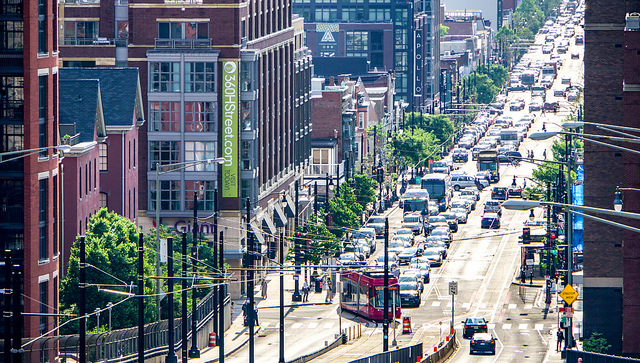
Photo by PoPville flickr user Ted Eytan
“Dear PoPville,
The relevant details: I’ll be moving from Los Angeles to DC this summer. My new job will likely be in Tyson’s Corner (blech). My girlfriend lives in Columbia Heights. I will have a car.
So: Where should I live that maximizes the advantages of living in DC (cool area! preferably not hours away from her) while still not providing a hideous reverse commute to and from Tyson’s. I will keep my car, so this would not have to necessarily be near a metro stop. She suggested Foggy Bottom, which seems boring. (I grew up in DC, but it’s been about a decade since I’ve lived here, so any help you can give is much appreciated.)
Tl;dr: Please tell me where to live that’s cool in DC but that won’t make me want to kill myself on my commute to and from Tyson’s every day.”


